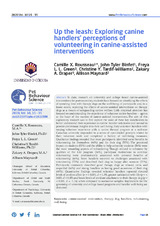Mostrar el registro sencillo del ítem
Up the leash: Exploring canine handlers’ perceptions of volunteering in canine-assisted interventions
| dc.contributor.author | Rousseau, Camille X. | |
| dc.contributor.author | Binfet, John-Tyler | |
| dc.contributor.author | Green, Freya L. L. | |
| dc.contributor.author | Tardif-Williams, Christine Y. | |
| dc.contributor.author | Draper, Zakary A. | |
| dc.contributor.author | Maynard, Allison | |
| dc.date.accessioned | 2020-11-03T11:30:06Z | |
| dc.date.available | 2020-11-03T11:30:06Z | |
| dc.date.issued | 2020 | |
| dc.identifier.issn | 2445-2874 | |
| dc.identifier.uri | http://hdl.handle.net/10396/20684 | |
| dc.description.abstract | To date, research on university and college based canine-assisted interventions for post-secondary students have focused on identifying the effects of spending time with therapy dogs on the well-being of participants and, to a lesser extent, exploring the effects of canine-assisted interventions on therapy dogs as a means of safeguarding canine welfare. Little empirical attention has focused on understanding the experience of volunteer canine handlers – agents at the heart of the success of canine-assisted interventions. The aim of this exploratory research was to first capture the voice of these key stakeholders to better understand their experience as canine handler volunteers and second to provide preliminary insights into their well-being. Sixty volunteer handlers with varying volunteer experience with a canine therapy program at a mid-size Canadian university responded to a series of open-ended prompts related to their volunteer work and completed a battery of well-being measures. Qualitative findings revealed that most participants identified social benefits to volunteering for themselves (64%) and for their dog (55%). The perceived impact on students (33%) and the ability to help university students (36%) were the most rewarding aspects of volunteering. Though enticed to volunteer by qualities of the CAI program (36%), participant motivations to continue volunteering were predominantly associated with personal benefits of volunteering (44%). Most handlers reported no challenges associated with volunteering (73%) and described their dog as happy after sessions (71%). Participants commonly described good therapy dogs as relaxed, calm, and respectful (66%) and strong handlers as having good awareness of their dog (48%). Quantitative findings revealed volunteer handlers reported elevated levels of positive affect (p = < 0.001, d = 1.19), greater satisfaction with life (p = < 0.001, d = 0.85) and lower levels of avoidant attachment to their therapy dog (p = < 0.001, d = -1.16) when compared to normative samples. Implications for the governing of university and college based programs and handler well-being are discussed. | es_ES |
| dc.format.mimetype | application/pdf | es_ES |
| dc.language.iso | eng | es_ES |
| dc.publisher | Universidad de Córdoba, Departamento de Medicina y Cirugía Animal | es_ES |
| dc.rights | https://creativecommons.org/licenses/by-nc-sa/4.0/ | es_ES |
| dc.source | Pet Behaviour Science 10, 15-35 (2020) | es_ES |
| dc.subject | Canine-assisted intervention | es_ES |
| dc.subject | Therapy dog handlers | es_ES |
| dc.subject | Volunteering | es_ES |
| dc.subject | Well-being | es_ES |
| dc.title | Up the leash: Exploring canine handlers’ perceptions of volunteering in canine-assisted interventions | es_ES |
| dc.type | info:eu-repo/semantics/article | es_ES |
| dc.relation.publisherversion | http://www.uco.es/ucopress/ojs/index.php/pet/index | es_ES |
| dc.rights.accessRights | info:eu-repo/semantics/openAccess | es_ES |

